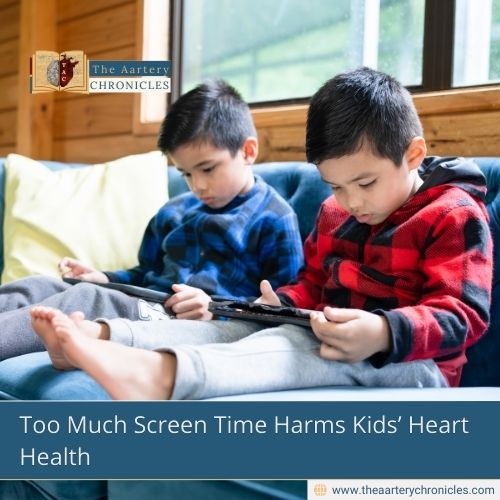

Screen Time and Kids’ Heart Health: What You Need to Know
Summary: According to a recent Danish study, children and teenagers who spend too much time on screens are at risk for developing heart and metabolic problems early on. Risk increases with each additional hour, particularly when combined with inadequate sleep.
Too Much Screen Time Could Be Harming Kids’ Hearts: New Study Warns
Did you know that only 29% of U.S. kids have a healthy heart profile?
A new study highlights how excessive screen time may be silently damaging children’s heart health. Researchers in Denmark found that children and adolescents who spend more time on phones, gaming consoles, or computers are at greater risk of developing early cardiometabolic issues.
This article examines the impact of screen habits on heart health, the importance of sleep, and strategies parents can employ to protect their children.
Why Screen Time Is a Growing Concern
The American Heart Association warns that cardiometabolic risk is showing up at younger ages. Data from 2013 to 2018 indicates that only 29% of U.S. children and teens aged 2 to 19 have a healthy cardiometabolic profile. Excessive use of TVs, smartphones, gaming devices, and computers is associated with risk of
- Higher blood pressure
- Cholesterol
- Insulin resistance
- Obesity
What the Danish Study Found
Researchers analysed data from over 1,000 participants in two long-term studies. They found a direct link between higher recreational screen use and elevated cardiovascular and metabolic risk among young people.
“Limiting discretionary screen time in childhood and adolescence may protect long-term heart and metabolic health,” said Dr. David Horner, lead author and researcher at the University of Copenhagen.
How Screen Time Affects Heart and Metabolic Health
Screen time was measured across activities like
- TV
- Movies
- Gaming
- Mobile use
Researchers developed a cardiometabolic score based on
- Waist size
- Blood pressure
- HDL cholesterol
- Triglycerides
- Blood sugar
- Each extra hour of screen time raised the risk score by 0.08 standard deviations in 10-year-olds and 0.13 in 18-year-olds.
- A child with 3 extra hours daily could have up to half a standard deviation higher risk compared to peers.
“When screen time reaches 5–6 hours a day, the cumulative effect becomes significant,” said Horner.
The Sleep Connection: Why It Matters
Sleep plays a critical role in this relationship:
- Shorter sleep duration and late bedtime increased the effect of screen time on cardiometabolic risk.
- About 12% of this risk was explained by insufficient sleep.
Tip: Reducing screen time before bedtime may help prevent metabolic issues.
A Biological ‘Screen-Time Fingerprint’
Machine learning analysis found a unique blood metabolite signature connected to screen time. This “screen-time fingerprint” shows that screen habits create measurable biological changes linked to future heart disease risk
What Parents Can Do
According to experts, modeling healthy screen habits is key:
- Encourage device-free meals and family time.
- Avoid screens before bedtime.
- Teach kids to manage boredom without screens.
“Boredom breeds creativity,” said Dr. Amanda Marma Perak, chair of AHA’s Young Hearts Committee.
What Parents Can Do
Self-reported screen time was used in the observational study, which might not accurately represent actual use. Future research might examine whether limiting screen use in the evening reduces risk.
Final Thoughts
Screen time is here to stay, but balance is essential. Excessive screen use combined with poor sleep can accelerate early warning signs of heart disease. Encouraging healthy habits now can protect long-term heart health.
Frequently Asked Questions (FAQs)
1. How much screen time is safe for kids?
The American Academy of Paediatrics recommends no more than 1 hour per day of recreational screen time for children aged 2–5 and consistent limits for older children. Teens should aim for balanced routines with physical activity, sleep, and screen use.
2. Can screen time cause heart disease in kids?
Screen time alone does not directly cause heart disease, but excessive use is linked to early signs of cardiometabolic risk, such as high blood pressure, obesity, and abnormal cholesterol levels, which can increase heart disease risk later in life.
3. What is cardiometabolic risk?
Cardiometabolic risk refers to a cluster of factors that increase the likelihood of heart disease, stroke, and diabetes. These include high blood pressure, unhealthy cholesterol, excess waist size, high blood sugar, and insulin resistance.
4. Does screen time affect sleep?
Yes. Blue light from screens can delay melatonin production, making it harder for kids to fall asleep. Late-night screen use is linked to shorter sleep duration and poor sleep quality.
5. How can parents reduce kids’ screen time?
- Set screen-free zones like bedrooms and dining tables.
- Encourage physical activity and outdoor play.
- Move screen time earlier in the day to avoid sleep disruption.
- Model healthy screen habits as a parent.









